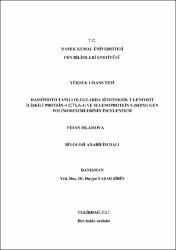| dc.contributor.author | İSLAMOVA, Fidan | |
| dc.date.accessioned | 2018-02-02T12:31:03Z | |
| dc.date.available | 2018-02-02T12:31:03Z | |
| dc.date.issued | 2017 | |
| dc.identifier.uri | https://hdl.handle.net/20.500.11776/2584 | |
| dc.description.abstract | Otoimmun tiroiditi olan Hashimoto tiroiditi (HT) hipotiroidizmin en sık nedenlerindendir. HT’nin patogenezinde genetik faktörler önemli role sahiptir. Bu güne kadar HLA, bağışıklık düzenleyici genler CD40, CTLA-4, PTPN22 ve CD25, tiroid özgü genler ( tiroglobulin ve tiroid uyarıcı hormon TSH reseptör ) gibi birçok gen lokusu HT ile ilişkilendirilmiştir. Sitotoksik T lenfosit antijen-4 homeostaz ve immun yanıtın negatif düzenlenmesinde önemli etkiye sahiptir. Literatürde CTLA-4 (49A/G) ve SEPS1 -105G/A gen polimorfizmlerini araştıran sınırlı sayıda çalışma bulunmaktadır. CTLA-4 49A/G ve SEPS1 -105G/A polimorfizmlerinin Hashimoto tiroidi ile ilişkili olduğu düşünülmektedir. Çalışmamıza 19-71 yaş aralığında Hashimoto tiroidi tanısı konulmuş 55 olgu ve kontrol grubu olarak 50 sağlıklı birey dahil edilmiştir. Hashimoto tiroiditi tanısı konulmuş hastaların 12’si erkek 43’u ise kadındır. Olgu ve kontrol grubu bireylere ait kan örneklerinden DNA izolasyonu yapılmış ve CTLA-4 49A/G, SEPS1 -105G/A polimorfizminin varlığı PZR-RFLP yöntemi ile araştırılmıştır. Çalışılan 55 olgudan 26’sının ve 50 kontrol bireyden 19’nun Heterozigot AG genotipine sahip olduğu saptanmıştır. Yapılan istatistiksel analiz sonucunda CTLA-4 49A/G polimorfizminin HT ile ilişkili olmadığı görülmüştür. Uygulanan PZR-RFLP yöntemi ile SEPS1 -105G/A polimorfizmi saptanamamıştır. | en_US |
| dc.description.abstract | Hashimoto’s disease being autoimmune thyroiditis is the most common cause of hypothyroidism. Genetic factors play an important role in the pathogenesis of Hashimoto thyroiditis. To date, several loci have been associated with HT, such as HLA, immune-regulatory genes CD40, CTLA-4, PTPN22, FOXP3 and CD25 and thyroid-specific genes (thyroglobulin and thyroid-stimulating hormone TSH receptor). Cytotoxic T-lymphocyte antigen-4 (CTLA-4) has an important role in homeostasis and negative regulation of immune responses. The aim of our study was to investigate 49A/G polymorphism of CTLA-4 gene has been associated with Hashimoto thyroiditis . There is only one research about CTLA-4 49A/G and SEPS1 -105G/A gene polimorphism. In our study included 55 patients diagnosed with Hashimoto's thyroiditis between 19-71 years old and 50 patients in healthy control groups. Our patient group with hashimoto’s thyroiditis are 12 men and 43 women. Blood samples were collected for DNA isolation and PCR-RFLP were studied. Twenty-six of the 55 strains studied and 50 control individuals were found to have 19 genotypes of Heterozygous AG. Statistical analysis revealed that CTLA-4 49A / G polymorphism was not associated with HT. We used PCR-RFLP methods and in the present study, no association between the SEPS1 -105G/A variation and Hashimoto’s thyroiditis was identified. | en_US |
| dc.language.iso | tur | en_US |
| dc.publisher | Namık Kemal Üniversitesi | en_US |
| dc.rights | info:eu-repo/semantics/openAccess | en_US |
| dc.subject | Hashimoto tiroiti | en_US |
| dc.subject | CTLA-4 | en_US |
| dc.subject | SEPS1 | en_US |
| dc.subject | PZR | en_US |
| dc.subject | RFLP | en_US |
| dc.title | Hashimoto tanılı olgularda sitotoksit t lenfosit ilişkili PROTEİN -4 (CTLA-4) ve selenoprotein S(SEPS1) gen polimorfizmlerinin incelenmesi | en_US |
| dc.title.alternative | EXAMINATION OF (CYTOTOXIC T LYMPOCYTE-ASSOCIATED PROTEIN-4) (CTLA-4) AND SELENOPROTEIN S (SEPS1) GENE POLYMORPHISMS IN HASHIMOTO DIAGNOSED CASES | en_US |
| dc.type | masterThesis | en_US |
| dc.department | Enstitüler, Fen Bilimleri Enstitüsü, Biyoloji Ana Bilim Dalı | en_US |
| dc.relation.publicationcategory | Tez | en_US |



















